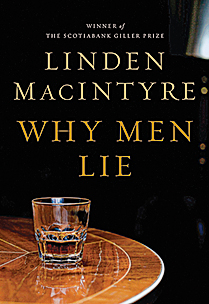 To judge Why Men Lie by its title, it seems destined for brisk sales in the self-help section. That’s a mistake, and not only because it’s a nuanced novel—the last of Linden MacIntyre’s “Cape Breton trilogy,” joining The Long Stretch and The Bishop’s Man, the Giller Prize winner about “fixer” priest Duncan MacAskill. Set in late-1990s Toronto, Why Men Lie focuses on Duncan’s sister Effie MacAskill Gillis, a self-reliant fiftysomething professor of Celtic studies, who lives alone after a lifetime of men letting her down. Still, Effie is drawn into a love affair with J.C. Campbell, a television producer from her past. J.C. harbours shadowy secrets. He’s obsessed with a prisoner on Texas death row he’s covering for a story, he has violent altercations with strangers, he is unreliable, he’s spotted talking to a hooker.
To judge Why Men Lie by its title, it seems destined for brisk sales in the self-help section. That’s a mistake, and not only because it’s a nuanced novel—the last of Linden MacIntyre’s “Cape Breton trilogy,” joining The Long Stretch and The Bishop’s Man, the Giller Prize winner about “fixer” priest Duncan MacAskill. Set in late-1990s Toronto, Why Men Lie focuses on Duncan’s sister Effie MacAskill Gillis, a self-reliant fiftysomething professor of Celtic studies, who lives alone after a lifetime of men letting her down. Still, Effie is drawn into a love affair with J.C. Campbell, a television producer from her past. J.C. harbours shadowy secrets. He’s obsessed with a prisoner on Texas death row he’s covering for a story, he has violent altercations with strangers, he is unreliable, he’s spotted talking to a hooker.
None of this much perturbs Effie, a wry, thoughtful character at home with bad choices; in mid-life she remains a magnet to former lovers who clog her apartment like it’s a bus station. She philosophizes about late-in-life love as she focuses on her daughter’s marriage to an older man and herding her exes, who command much of the novel’s psychic space. That Effie’s a successful academic appears as window dressing.
A lot of Why Men Lie doesn’t add up. There’s no reveal of the dark secrets of Effie’s past, alluded to in a narrative that tos and fros between past and present. Still, there’s an odd, mesmerizing pull to the tale; MacIntyre can build suspense from thin air. In the end, the reader never does learn why men lie—other than the obvious: they’re mortal, and can. Those who thrive on ambiguity won’t care. MacIntyre’s gift is capturing the poetic thrum of life’s unanswered questions and ragged endings. That his book is left with one is the price paid.